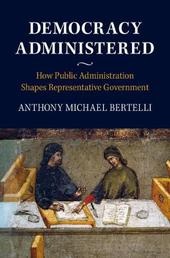
|
Democracy Administered: How Public Administration Shapes Representative Government
Hardback
Main Details
| Title |
Democracy Administered: How Public Administration Shapes Representative Government
|
| Authors and Contributors |
By (author) Anthony Michael Bertelli
|
| Physical Properties |
| Format:Hardback | | Pages:200 | | Dimensions(mm): Height 235,Width 157 |
|
| ISBN/Barcode |
9781107169715
|
| Classifications | Dewey:351 |
|---|
| Audience | | Professional & Vocational | |
|---|
|
Publishing Details |
| Publisher |
Cambridge University Press
|
| Imprint |
Cambridge University Press
|
| Publication Date |
9 September 2021 |
| Publication Country |
United Kingdom
|
Description
How does representative government function when public administration can reshape democracy? The traditional narrative of public administration balances the accountability of managers, a problem of control, with the need for effective administration, a problem of capability. The discretion modern governments give to administrators allows them to make tradeoffs among democratic values. This book challenges the traditional view with its argument that the democratic values of administration should complement the democratic values of the representative government within which they operate. Control, capability and value reinforcement can render public administration into democracy administered. This book offers a novel framework for empirically and normatively understanding how democratic values have, and should be, reinforced by public administration. Bertelli's theoretical framework provides a guide for managers and reformers alike to chart a path toward democracy administered.
Author Biography
Anthony Bertelli is the Sherwin-Whitmore Professor in Liberal Arts, Pennsylvania State University, and Professor of Political Science, Bocconi University. He is the author of five books including Madison's Managers: Public Administration and the Constitution (2006), is a member of the National Academy of Public Administration, and winner of the Herbert Simon Award for career contributions to the study of bureaucracy.
Reviews'This brilliantly written book reflects the critical role public administration plays in representative democracies. Bertelli weaves international experiences into his universally relevant narrative. Not since the early treatises by key figures in American public administration have we seen such a significant contribution to the field. This is essential reading for scholars and students of public administration.' Norma M. Riccucci, Rutgers University, Newark 'An urgent debate is happening globally regarding the nature, significance, and prospects for democracy and representative government. Central to this debate is which public values are to be served, by whom, and how - and central to that is what the role of public administration is and ought to be. Bertelli's important new book engages this debate head on and illuminates it in ways crucial for theory, practice, and research. He forcefully argues that 'the fundamental problem' of public administration is neither the capabilities nor the control of public managers, but instead how they can and should behave to achieve the aims of representative government. The book is a must-read for everyone interested in representative democracy and public administration.' John Bryson, University of Minnesota 'Tony Bertelli provides a unique and original approach to democratic accountability in complex administrative structures. This book is indispensable for those wanting to think seriously about accountability and democratic values in the modern state.' Keith Dowding, Australian National University 'We know that efficient, effective and equitable administration of law and policy is important for the well-being of democracy. But Bertelli turns the equation around, vividly illuminating how public administrators make fundamental decisions about the conduct of democracy itself. Bridging democratic theory and public administration, he demonstrates how the democratic values of public administrators are the missing link in debates about the quality and character of representative democracy.' Christopher Ansell, University of California, Berkeley
|